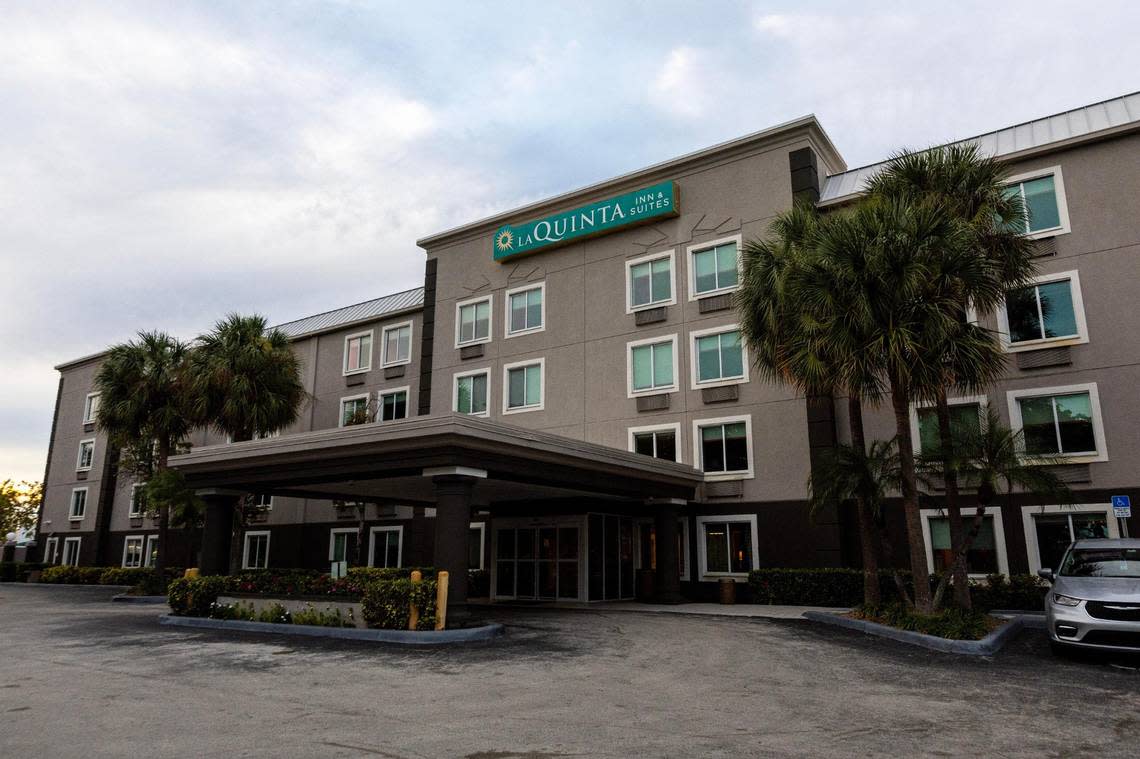As state’s camping ban looms, Miami-Dade will vote on buying hotel for homeless seniors
As cities and counties across Florida face an Oct. 1 deadline for a new state law that will prohibit people from sleeping or camping in public spaces, Miami-Dade County commissioners voted Wednesday to move forward with plans to convert a Cutler Bay hotel into subsidized housing for homeless seniors.
Counties are legally responsible for enforcing the ban, which Gov. Ron DeSantis signed into law in March. In many places, anyone sleeping in public will face arrest.
Under pressure to manage Miami-Dade’s 1,000-person unsheltered population in the coming weeks, county commissioners scheduled a vote on the hotel conversion to take place at a meeting Sept. 17.
“The homeless crisis is deepening in our county, particularly when we look at aging adults,” said Commissioner Eileen Higgins, who supports the project.
The Cutler Bay project involves a rehabbed La Quinta property at 10821 Caribbean Blvd. that would be able to house roughly 130 residents who are 55 or older. Miami-Dade’s homelessness agency, the Homeless Trust, is awaiting final approval from commissioners to purchase the property for $14 million after an initial vote to advance the project in May.

While noting the importance of providing stable and permanent housing to low-income homeless seniors, Commissioner Danielle Cohen Higgins, who represents Cutler Bay, remained vociferously opposed to the project.
“I do not, cannot and will not” support the measure, she said Wednesday.
Over her objections, commissioners voted 10-3 to suspend normal procedural rules that gave her the exclusive rights to introduce the legislation needed to close the deal, with only Kevin Cabrera, Anthony Rodriguez and Cohen Higgins dissenting. That allows the proposal to move forward to a final vote later this month.
At previous meetings, critics charged that La Quinta’s location — next to the soon-to-be-redeveloped Southland Mall — made it a poor choice for the subsidized housing project. “It’s on land we’d like to develop,” Cutler Bay Town Manager Rafael Casals told the Miami Herald after the meeting.
Cohen Higgins, meanwhile, focused on the La Quinta’s price tag.
Although the Homeless Trust has agreed to purchase the property for $14 million, four appraisals have valued it at just under $10 million. Cohen Higgins questioned that discrepancy and asserted that better, more affordable options are possible.
“We’re paying above the appraised value; we don’t hide that,” Homeless Trust Chairman Ron Book told the Herald after the meeting. Between unavoidable buyout fees that need to be paid to La Quinta and rebooking rooms for the hotel’s would-be guests, costs added up.
“But there’s a lack of housing availability, and we don’t have the time or the money to build our way out of that problem,” Book said, adding, “There isn’t another location in the county that works from a size, capacity and cost perspective. We searched long and hard.”
The meeting took a more contentious turn when Cohen Higgins called into question the Homeless Trust’s transparency. The Trust, whose budget is north of $136 million per year, “hasn’t been audited in the last decade,” she proffered.
Types of audits vary. The Trust’s director, Victoria Mallette O’Brien, clarified that the U.S. Department of Housing and Urban Development, as well as the state of Florida, both of which provide the Trust with funding, regularly audit the organization.
Speaking outside the commission chambers, Jose de la Torre, a 62-year-old chef who found himself sleeping on the streets after running into health troubles last year, said he hoped the county would approve the hotel purchase. De la Torre said he has since found his way into a shelter but that proposals like the La Quinta project would offer people like him more reliable housing.
Pointing to his blue shirt, which dozens of the measure’s backers wore to the meeting, de la Torre smiled.
“I would be a good neighbor,” he said, reading the words written in big white letters on the shirt’s front.
This story was produced with financial support from supporters including The Green Family Foundation Trust and Ken O’Keefe, in partnership with Journalism Funding Partners. The Miami Herald maintains full editorial control of this work.





